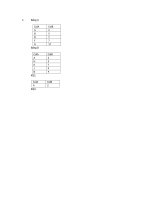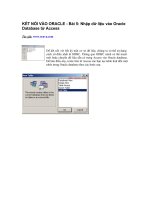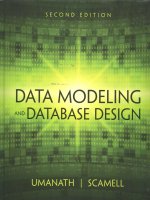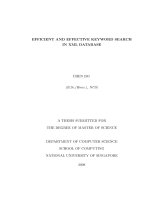presentatie YDW database exploratie
Bạn đang xem bản rút gọn của tài liệu. Xem và tải ngay bản đầy đủ của tài liệu tại đây (175.73 KB, 21 trang )
Information cluster session
EurOccupations: Developing a detailed 8-country occupations database for
comparative socio-economic research in the European Union
Specific Targeted Research Project (STREP), EU FP6
Project period: May 2006-May 2009
EurOccupations expert conference, 20-05-08, Marseille, France
Yves De Weerdt
Structure of session
•
Presentation of the cluster
– Occupations and areas of work
– Overview of survey respons
•
Main questions
•
Formulation of hypotheses
•
Presentation of results
•
Discussion
•
Recruitment
Structure of cluster
•
Finances, bank, insurance
– Accountant
– Bank clerk
– Estate agent
– Financial clerk
– Financial institution branch manager
– Mortgage clerk
Structure of cluster
•
IT, automation, telecommunication
– Database designer
– IT applications programmer
– IT systems administrator
– Telecommunication equipment installer or repairer
– Web designer
Structure of cluster
•
Legal, administration, inspection, policy
adviser
– Judge
– Lawyer
– Policy adviser
– Tax inspector
Structure of cluster
• Marketing, PR, advertising
– Marketing manager
Structure of cluster
•
Media, graphic, printing, culture, design
– Journalist
– Musical instrument maker
– Portrait, wedding or other events photographer
– Printing machine operator
Survey response: experts
B
Accountant
Bank clerk
Database designer
Estate agent
Financial clerk
Financial institution branch manager
IT applications programmer
IT systems administrator
Lawyer
Marketing manager
Mortgage clerk
Policy adviser
Portrait, wedding or other
events photographer
Printing machine operator
Tax inspector
Web designer
Journalist
Judge
Telecommunication equipment
installer or repairer
Total
D
UK
FR
IT
1
1
5
1
1
NL
4
4
2
6
2
1
3
4
2
2
3
7
1
1
1
2
1
1
SP
3
1
1
2
1
2
3
3
1
2
PO
4
1
1
1
1
1
1
1
1
1
1
2
4
1
2
0
0
0
69
Table of occupation by LANDCODE
Survey response: occ. workers
occupation
LANDCODE
be
Accountant
3
Bank clerk
1
Database designer
1
de
en
fr
3
3
2
nl
4
po
8
sp
1
1
1
Estate agent
Financial clerk
it
2
Financial institution branch manager
1
1
4
1
1
2
1
1
3
7
1
1
5
3
4
14
1
1
3
2
9
Journalist
1
1
2
1
5
Lawyer
1
1
1
1
4
Marketing manager
1
2
3
Mortgage clerk
1
1
2
Musical instrument maker
1
2
3
1
2
IT systems administrator
Policy adviser
1
22
4
1
IT applications programmer
1
1
1
6
1
1
Printing machine operator
1
1
Tax inspector
1
1
Telecommunication equipment installer or repairer
1
1
3
Total
10
1
2
8
1
1
5
Portrait, wedding or other events photographer
Web designer
Total
1
3
1
1
1
1
8
21
20
26
14
102
MAIN questions
•
Often heard statement: the importance of skills is
taking over from the importance of education,
CERTAINLY in service or commercially oriented
sectors
•
Do we find support for this?
•
What are the implications for education and/or
recruitment practices?
HYPOTHESES
•
If our assumption is true, we expect:
– a high(er) level of skillsmismatch in this cluster
– that some sectorspecific skills are clearly more
important
– that ‘professional’ competences would be less
important in this cluster
Under/overskilling
Formal Q = Q demand
Frequency
Percent
Yes
186
76.54 %
No
42
17.28 %
Don’t know
15
6.17 %
•
1 out of 4 occupational workers says his or her
education does not match the required education
for the occupation
•
Over 90% know if their education matches the
occupational demands BUT we don’t know what
missing values mean…
•
Interesting differences between clusters
Skillmatch (% yes by cluster)
Care & welfare
Clerks, staff & management
Construction & cars
Educ., research & personnel
Inf., comm., finance, legal
Manufacturing
Trade & agriculture
Transp, logistics, travel,…
71%
75%
81%
88%
64%
80%
80%
79%
Under/overskilling
Self
Frequency
Percent
Cumulative
Frequency
Cumulative
Percent
Missing
481
89.41
481
89.41
I’m underqualified
13
2.42
494
91.82
I’m overqualified
21
3.90
515
95.72
Don’t know
23
4.28
538
100.00
Under/overskilling
Self
Frequency
Percent
I’m underqualified
13
22.81%
I’m overqualified
21
36.84 %
Don’t know
23
40.35 %
• Cluster conclusion impossible
Competence
Care
Clerk
Constr
Edu
inf
Manu
trade trans
Commercial thinking
9%
28%
23%
13%
55%
11%
79%
31%
Communicate
82%
91%
66%
92%
85%
63%
89%
80%
Innovate work
31%
31%
19%
44%
28%
21%
7%
12%
Cope with stress
78%
78%
48%
77%
63%
50%
71%
80%
Networking
40%
47%
16%
47%
48%
11%
50%
13%
Problem solving
67%
71%
57%
82%
80%
63%
67%
72%
Apply professional
knowledge
81%
68%
86%
88%
72%
95%
79%
86%
Working in teams or individually
Care & welfare
11
5.02
50.00
13.41
8
3.65
36.36
9.64
3
1.37
13.64
5.56
22
10.05
Clerks, staff & management (and army)
16
7.31
32.65
19.51
20
9.13
40.82
24.10
13
5.94
26.53
24.07
49
22.37
Construction & cars
11
5.02
40.74
13.41
5
2.28
18.52
6.02
11
5.02
40.74
20.37
27
12.33
Education, research & personnel
16
7.31
43.24
19.51
11
5.02
29.73
13.25
10
4.57
27.03
18.52
37
16.89
Information, communication, finance, legal
11
5.02
28.95
13.41
24
10.96
63.16
28.92
3
1.37
7.89
5.56
38
17.35
Manufacturing: food, metal, oil, gas & mining
4
1.83
26.67
4.88
5
2.28
33.33
6.02
6
2.74
40.00
11.11
15
6.85
Trade & agriculture
6
2.74
42.86
7.32
3
1.37
21.43
3.61
5
2.28
35.71
9.26
14
6.39
Transport, logistics, travel & cleaning/garbage
7
3.20
41.18
8.54
7
3.20
41.18
8.43
3
1.37
17.65
5.56
17
7.76
Total
82
37.44
83
37.90
54
24.66
219
100.00
Conclusions
•
Hypothesis mostly confirmed
•
BUT: (a) does this support the vision of our
experts, and (b) can we speak of a trend?
•
Are there other observations the experts
make based on these results?
Expert recruitment
• Do you have ideas about stimulating
participation of experts in this
research for this cluster? (e.g. are
there international networks we could
appeal to?)









